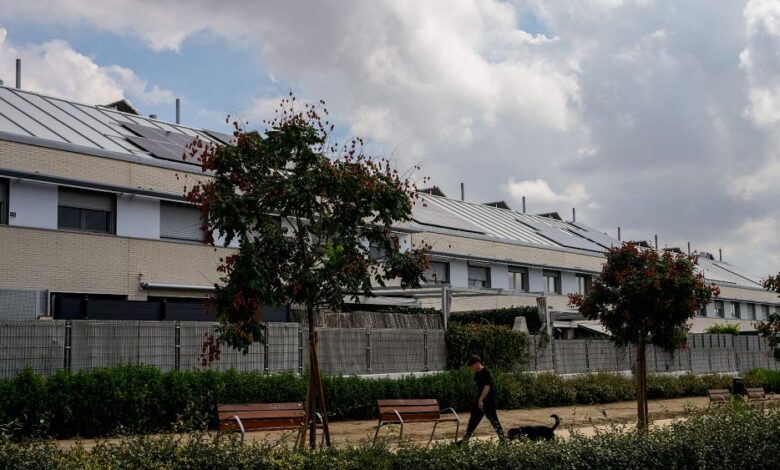Spain faces €8 billion in renewable legal claims over past solar boom

When work started on Andasol in 2008, it was the largest solar energy plant in the world and its black panels stretched over enough land to cover 70 football pitches in the south of Spain near Granada.
Fourteen years later, the 51-hectare plant which produces a total of 495 GW-h of power per year, is embroiled in a multi-million-euro international legal battle between the Spanish government and a series of investors.
But this is just one of 51 claims totalling €8 billion that Spain’s left-wing coalition government is fighting against.
The coalition government has made championing renewable energy a key policy but faces claims from investors over an earlier green energy boom that they are owed millions over state incentives that were later withdrawn by Madrid.
The claims were filed under the Energy Treaty Charter (ECT), a multilateral treaty signed by 53 countries which has been in force since 1994. Investors in the energy sector enjoy special protection under the treaty.
Several European countries, including Spain, have recently announced plans to withdraw from the ECT, as they say it threatens their climate goals by allowing energy companies to sue governments.
The treaty has a sunset clause that means any country that leaves will remain subject to litigation for 20 years.
So far, 28 of these claims have been resolved, 21 in favour of the investors and Madrid has been ordered to pay €1.2 billion in compensation for cases it has lost. Spain has not paid out any of these claims.
Spain has contested these awards and has asked international arbitration organisations to annul them, claiming in some cases the tribunals were partial.
In other cases, Madrid has said if it paid the money which tribunals said it owed, it would be construed as state aid, which was forbidden by the European Commission.
Why is Spain facing legal claims?
In 2007, Spain implemented several regulatory measures with the purpose of stimulating investment in the burgeoning renewable energy sector.
Initially, the system was a huge success, attracting interest from domestic investors and international companies.
However, after the boom, came the bust.
After the 2008 financial crisis, Spain was no longer able to guarantee the initial incentives and between 2012-2014, the government retrospectively removed them, prompting legal claims by the investors.
One of these claims started in 2013, when Infrastructure Services Luxembourg S.A.R.L and Energia Termosolar B.V, filed an arbitration claim against Spain with the International Centre for Settlement Investment Dispute (ICSID), alleging it breached its obligations under the Energy Charter Treaty because it removed incentives.
The companies claimed €196 million in damages. Spain denied the claim. Another investor involved in the same plant has also claimed damages.
Six years later, the tribunal ruled in favour of the companies and awarded €101m.
Spain has filed an application to annul the award, saying it would be construed as state aid.
Lawyers for the investors said they will pursue Spanish investments around the world to ensure payment.
“It is not just exceptional but deeply unfortunate that Spain, a prominent member of the international sovereign community, is choosing not to pay (this) award, despite a final arbitration award against it, and in doing so is refusing to honour its international ECT obligations,” Nick Cherryman, partner at Kobre & Kim, which acts for the two companies in the Andasol case, told Euronews.
“The situation is even more extraordinary given the geopolitics in the world and the expectation that sovereign (states) should respect international laws and obligations and doubly ironic given the Spanish government’s avowed desire to encourage investment in renewable energy projects.”
The Spanish government said in 2013 it approved a law which reduced the expected profitability from “numerous” renewable installations.
Six years later, it granted those companies a 7.39% profitability until 2031, which reduced the number of claims dramatically.
“Of the 51 claims, tribunals have made decisions on 28 cases. One was annulled, the others are awaiting decisions. Three other claims have been discontinued. The tribunal decisions have reduced the amounts claimed substantially. In other cases, Spain is appealing to annul the claims,” a spokesman for the Environment Ministry said.
A G20 state, Spain has been placed second in the world in terms of countries which default on debts, after Venezuela, according to a recent report by Nicos Lavranos, an arbitration expert.
What does it mean for Spain’s renewable future?
Despite the legal action which Spain faces, a recent report by the consultancy EY suggested it was among the top ten countries in the world for investment in the renewable sector.
Spain’s recent climate change law said that by 2050, the Spanish economy must be carbon neutral and by 2030, there should be a 23% cut in greenhouse gas emissions compared to 1990.
By 2030, at least 42% of all national energy must also come from renewable sources.
Lucia Barcena, a researcher from Transnational Institute, an international advocacy organisation, wrote a report with her colleague Fabian Flues on the legal battle called From Solar Dream to Legal Nightmare.
She said despite the raft of litigation facing Spain, she believes this will not influence its modern-day push to become a renewable energy powerhouse.
“It has been political and policy changes, not investment arbitration cases, that have been able to improve the situation for renewable investors in Spain,” she told Euronews.
She said often investors were not even aware that the rights offered by investment treaties like the Energy Charter Treaty lead to an increase in investment and often investors are unaware of treaties when they decide to put money into a country.
After the 2007 renewables boom, she said smaller investors had found it hard to compete with larger international investors who could afford to take their cases to international tribunals.
Spain’s Supreme Court had ruled against these smaller companies, saying the government provision for these companies was sufficient.
Get Best News and Web Services here







